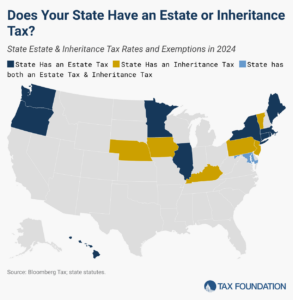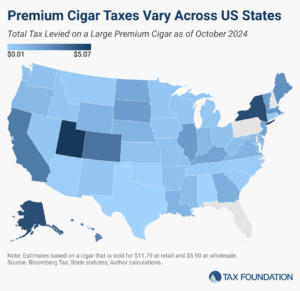Estate and Inheritance Taxes by State, 2024
In addition to the federal estate tax, with a top rate of 40 percent, 12 states and DC impose additional estate taxes, while six states levy inheritance taxes.
7 min readPennsylvania‘s tax system ranks 34th overall on the 2025 State Tax Competitiveness Index. Pennsylvania’s corporate income tax rate is unusually high but is slowly phasing down to a competitive 4.99 percent. Pennsylvania also has a low, flat state-level individual income tax rate of 3.07 percent, but local earned income taxes (on a narrower base than the state income tax) dramatically increase overall levels of income taxation in the Commonwealth.
Pennsylvania is among the very few states to significantly cap net operating loss carryforwards, limiting them to 40 percent of taxable income, but recently enacted legislation will phase this cap up to 80 percent, in 10 percentage point increments, from 2025 through 2029. The Commonwealth does not conform to the Section 168(k) first-year expensing regime offered at the federal level. Pennsylvania also allows localities with existing gross receipts taxes to retain them, though new local gross receipts taxes cannot be created.
Local governments, meanwhile, operate under a patchwork of different state-imposed tax rules, with Philadelphia possessing unique authority given to no other jurisdiction. Consequently, Pennsylvania’s local taxes are among the more complex and burdensome in the country.
| Category | Rank | Rank Change | Score |
|---|---|---|---|
| Overall | 34 | 0 | 4.93 |
| Corporate Taxes | 38 | 1 | 4.82 |
| Individual Income Taxes | 38 | 0 | 4.68 |
| Sales Taxes | 22 | -1 | 4.84 |
| Property Taxes | 9 | 1 | 5.97 |
| Unemployment Insurance Taxes | 36 | -4 | 4.59 |

In addition to the federal estate tax, with a top rate of 40 percent, 12 states and DC impose additional estate taxes, while six states levy inheritance taxes.
7 min read
Over 500 million premium cigars were sold in the United States in 2023. With each sale comes a complex tax landscape.
4 min read
Policymakers can and should address taxpayers’ legitimate grievances about out-of-control property tax bills, but they should do so without upending a system of taxation that is more efficient, fair, and pro-growth, and better suited to municipal finance, than any of the alternatives.
39 min read